Oorja Development Solutions (Oorja) is a purpose-driven social enterprise in India working at the intersection of sustainable agriculture and renewable energy. It finances, deploys, owns, operates and maintains decentralised solar infrastructures at the farm level and sells irrigation, milling, and cooling services to marginal farmers in the states of Uttar Pradesh and Bihar. In this Good Practice Note, Argha Ghose and Ankur Singh discuss the evolution of Oorja and how it has created significant social, economic and environmental impacts by strengthening farmers’ livelihoods, reducing carbon emissions and promoting sustainable agriculture.
CONTEXT
Smallholder farmers in India are on the frontlines of the climate and agrarian crisis and they include most of the farming population in the country. They face high input costs, are very sensitive to climate risks, lack knowledge of sustainable agricultural practices, and experience crop yields that are ~50% lower than the potential, leading to low and irregular income. They rely on diesel-based machinery for their energy needs on the farm, and switching to cheaper renewable energy is not possible for most farmers due to high upfront costs, lack of awareness, and financing options.
Oorja Development Solutions (hereafter referred to as Oorja) is a Farming-as-a-Service company working at the intersection of clean energy and sustainable agriculture. It provides affordable solar-powered irrigation, milling, and cooling services to smallholder farmers on a Pay-Per-Use basis, in the weak-grid areas of northern and eastern India.
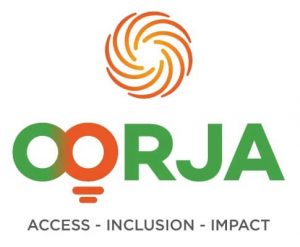 Oorja aims to:
Oorja aims to:
- reduce reliance on fossil fuels and fossil-derived chemical inputs;
- increase agricultural productivity and farmers’ income;
- mitigate carbon emissions and build climate-
Oorja has developed its portfolio of agri-energy services in response to the pressing needs of small-scale farmers. Oorja finances, deploys, owns, operates and maintains decentralised solar infrastructures at the farm level and sells irrigation, milling, and cooling services to marginal farmers who earn $60 – $100 per month. It has pioneered an inclusive and customer-centric Pay-Per-Use business model to deliver productive use services, removing the barrier of upfront technology acquisition costs. Given the price sensitive nature of the market it operates in, all services are sold at affordable tariffs that are up to 60% cheaper than diesel alternatives. Users pay only according to the amount of water pumped, the weight of produce milled or stored. Oorja also takes care of the maintenance of its solar assets and equipment – eliminating the cost of repairs and maintenance for end users. Due to the on-farm and near-farm availability of these services users also save on transportation and other logistical expenses.
MAKING CLEAN ENERGY ACCESSIBLE FOR ALL
Decentralised solar-powered productive energy has been a good solution for the problems faced by the last-mile agrarian communities in developing countries. In India, there have been some government schemes providing capital subsidies for decentralised solar-powered irrigation systems. However, high upfront costs have so far limited their adoption among farmers with limited budget, landholding and social capital. Most of these schemes have failed to reach small and marginal landholders and economically disadvantaged farmers. These schemes mostly targeted medium to large landholders with average landholding that is much higher than the state average, worsening the divide between small and large farmers’ access to technology, agricultural productivity, and farmer income.
Innovative business models and end-user financing schemes are being explored and implemented in the Global South in response to challenges faced in the water-energy-food nexus. These models have been applied to address issues specific to the agricultural sector. For instance, Pay-as-you-go (Paygo) models have been successful in mainstreaming access to household solar appliances and small agri appliances. However, they are not suited for larger and more expensive solar infrastructures such as water pumps or cold storage facilities. Pay-Per-Use is a nascent business model that has emerged due to the need for large productive-use of equipment, especially in the agricultural sector. The ‘servitisation’ of high-cost productive use assets, removing the upfront cost barrier, is an effective model to provide energy access to last-mile agrarian communities.
Oorja’s Pay-Per-Use model effectively bridges the investment gap for agri-energy infrastructures by turning farming needs into services. Under this model, the company installs, owns and operates a solar-powered infrastructure for income-generating activities such as irrigation. There is no entry barrier of upfront cost for smallholder farmers. Users pay only according to the amount of irrigation water pumped and the weight of produce milled or stored. Given the price-sensitive nature of the target consumers, all of Oorja’s services are sold at affordable fixed tariffs that are up to 60% cheaper than diesel alternatives. Oorja also takes care of the maintenance of its solar assets and equipment, eliminating the cost of repairs and maintenance for end users. Due to the on-farm and near-farm availability of the services, users also save on transportation and other logistical expenses. This effective servitisation of decentralised solar-powered productive energy has allowed the poorest farmers to access ‘productive use’ appliances, thus making clean energy accessible, affordable, reliable and convenient for all.
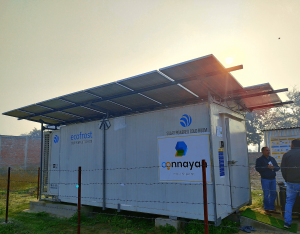 A solar cold storage in Bahraich district, Uttar Pradesh. These 5 MT cold rooms can store 30+ types of perishable produce, thereby achieving 400% higher shelf life.
A solar cold storage in Bahraich district, Uttar Pradesh. These 5 MT cold rooms can store 30+ types of perishable produce, thereby achieving 400% higher shelf life.
OPERATIONAL MODEL
Oorja undertakes end-to-end project development – from site identification to installation to operations and maintenance of assets. Oorja’s operations structure is based on Clusters, where assets are installed within an expanse of farmland (1-5 km) and serviced by a local field team. Each Cluster is comprised of 4 solar irrigation pumps, 1 integrated multipurpose pulveriser, and a 0.25 solar cold storage. The project development and implementation cycle is summarised below.
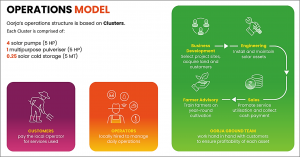
Site selection: Oorja uses a rigorous three-stage site selection process beginning with collection of ground data from prospective villages. The ground team analyses and conducts further research on these sites before visiting the ones that are deemed promising. Oorja has standardised operating procedures for demand assessment and digital tools for data-driven site selection. It conducts focus group discussions and individual surveys to assess the demand for services. These steps provide an overview of the local agricultural practices, groundwater table, crops grown, agricultural yield and current irrigation practices. This is followed by a field visit and community buy-in through membership fees before finalising the site. In the most favourable sites, Oorja will form groups of farmers with adjoining farmlands, and mobilise and educate the community about the benefits of the solar irrigation program. Then traditional marketing techniques are used to reach out to potential end-users. Videos, flyers, standees in local vernacular language, and exposure visits are organised to nearby project sites; gradually relationship and trust with the farming community is built up.
Procurement: In this step, high-quality solar pumping systems and agro-processing mills are procured from reputed manufacturers, for example, solar pumps from Shakti Pumps, agro-processing appliances from Centrifugal, and cold storage units from Ecozen. The pump sizing and head, motor selection and water output are optimised according to requirements.
Installation: In the third step, Oorja’s field team enters into a 10-year land lease agreement with a local landowner having land at the centre of each irrigation area (of approx. 15 acres) for installation of the solar pump and agro-processing equipment. Oorja then arranges for construction of borewells of an appropriate size. Oorja’s engineering team installs, tests and commissions the solar projects. It generally hires labour from the community, so they are also involved in the installation phase.
Operations and maintenance: Oorja hires Operators from the local rural community. The operators are responsible for the day-to-day operations, maintenance and payment collection from each cluster of solar projects. These Operators are trained by Oorja to deliver the Pay-Per-Use services, record the transactions, and collect payments from users. The company also takes care of the maintenance, resolves service issues, and monitors impact.
Oorja currently operates in Uttar Pradesh (Lucknow, Barabanki, Hardoi, Bahraich and Shravasti districts) and Bihar (Muzaffarpur and Samastipur districts) states of India.
OUR SERVICES
Oonnati
Launched in November 2018, this Pay-Per-Use community irrigation service enables farmers to transition from diesel-based pumping to affordable and reliable solar irrigation. Oorja deploys solar BLDC and AC submersible pumps of 5 HP capacity at the farm which can deliver up to 250 m3 of water per day, and sells water as a service at fixed tariffs. Water is metered using a flow metre and sold on a volumetric basis (per m3 of water delivered) to ensure a fair price to farmers irrespective of the time of day or season. Each pump typically allows 15-20 farmers with adjoining farmland to access irrigation water year-round on demand. Oorja’s tariffs are set to be up to 60% cheaper than the running cost of diesel groundwater pumping (including fuel, maintenance, and rents).
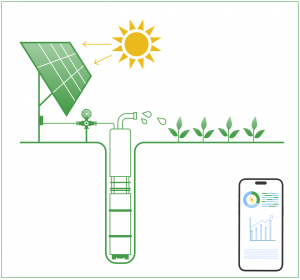 Schematic diagram of Oonnati solar irrigation pumping system and accompanying app for remote monitoring.
Schematic diagram of Oonnati solar irrigation pumping system and accompanying app for remote monitoring.
Oojjwal
Oojjwal is a Pay-Per-Use community milling service launched in July 2020. It is available for grinding grains, pulses, spices and other dried produce into edible food products. Multipurpose pulverisers of 5 HP capacity can mill around 40 kg per hour of wheat and serve the needs of up to 100 households. The service is priced per kg of produce at competitive tariffs that are up to 50% lower than market rates. These mills are integrated with solar pumps as the same solar PV array is used to power either the pump or the mill to increase the utilisation capacity. The mills usually run when pumps are not in use by diverting the solar power generated by the pump PV panels. As the mills are conveniently located at the farm level in villages, this saves women travel time and drudgery on processing activities.
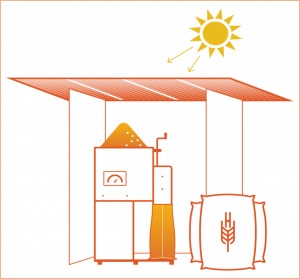 Schematic diagram of Oojjwal solar milling installation.
Schematic diagram of Oojjwal solar milling installation.
Oonnayan
This is a Pay-Per-Use community solar-powered cooling service, begun in March 2021. Oorja deploys 5 MT solar cold storages for use by 50 or more farmers. The system is available at the market or the farm gate and users can store their perishable produce – such as fresh vegetables, fruits, mushrooms or flowers. Users pay per-crate-per-day of produce stored, enabling them to extend the quality and shelf life of their products, reduce post-harvest losses and realise higher prices in the market. As the system is installed near the market gate, it also reduces farmers’ transportation cost and enables them to aggregate their produce. So far, Oorja’s cold storages have been used to store over 35 varieties of fresh produce, from carrots to litchi, and from pointed gourd (parwal) to mushrooms.
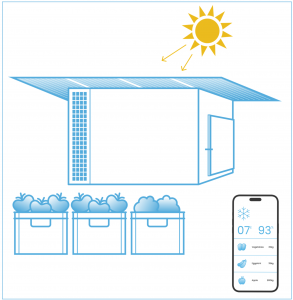 Schematic diagram of Oonnayan Solar Cold Storage and accompanying app for monitoring the produce’s shelf life. The latter was developed by BASE under the Your Virtual Cold Chain Assistant (YVCCA) project.
Schematic diagram of Oonnayan Solar Cold Storage and accompanying app for monitoring the produce’s shelf life. The latter was developed by BASE under the Your Virtual Cold Chain Assistant (YVCCA) project.
Climate Smart Farmer Advisory
In 2022, Oorja introduced its complementary Farmer Advisory service to provide smallholder farmers with training on modern and sustainable agronomic practices to help boost crop yields, engage in new growing seasons, and diversify their cropping patterns beyond staple crops and move towards high-value crops. This entails different types of training and demonstrations, which was provided by in-house agronomists, including best practices for each cultivation step, from soil preparation to precise irrigation to harvesting. Farmers are also introduced to methods like System of Rice Intensification (SRI), System of Wheat Intensification (SWI), and vermicomposting. It is estimated that implementing these climate adaptation measures would increase their crop yields by 7-15%. In addition, access to science-based cultivation guidance at the right time can complement the traditional method of agricultural practices and increase farm productivity by up to 20%.
The Farmer Advisory service has played a crucial role in improving smallholders’ livelihoods and reducing rural poverty by equipping farmers with the information, knowledge, and skills needed to increase their productivity and profitability, manage risks, and engage effectively with markets. The Farmer Advisory vertical is key to Oorja’s sales plan to reach its revenue and utilisation targets. With Oorja’s operations currently focused on the Indo-Gangetic plains of northern and eastern India, one of its goals is to help farmers of the region to expand to the fertile zayed season (March to June). Farmers in this region experience extreme poverty and their yields are often 50% less than its potential capacity. Oorja is promoting the third growing season through its Farmer Advisory vertical by supporting users with training on suitable zayed crops, cultivation methods, intercropping methods, and facilitating access to seed varieties and other inputs.
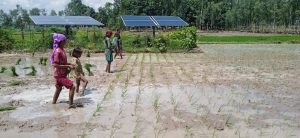 Farmers trained on the SRI method of rice cultivation under the Farmer Advisory service.
Farmers trained on the SRI method of rice cultivation under the Farmer Advisory service.
IMPACT TRAJECTORY
As of September 2023, Oorja has 111 operational solar assets serving 20,500+ beneficiaries in seven districts of Uttar Pradesh and Bihar, India. From 2020 to 2023, Oorja’s project deployments have increased by 517%, and the user base rose by 1221%. Its work has multidimensional impacts in energy access, clean energy, social development, job creation, gender, sustainable agriculture, food security and nutrition, thus strengthening several SDGs.
Environmental Impact
Oorja has an installed solar PV capacity of 469 kWp, that has cumulatively generated 1052 MWh. Providing solar-powered irrigation, milling and cooling services at affordable prices, it is accelerating access to modern clean energy – progressing steadily towards SDG 7 (Affordable & Clean Energy).
Oorja is also helping farmers transition from diesel towards low-carbon solar energy, reducing on-farm carbon emissions. Till date, 1,555 tons of CO2e emissions have been averted. Sixty-seven percent of its customers reported that they don’t use diesel pumps any more. A 96% reduction in diesel consumption was recorded among users. Additionally, Oorja has trained 800+ BOP farmers on sustainable agronomic practices, preparation and use of different types of organic pesticides, insecticides and vermicompost. They have transitioned from chemical inputs to natural or locally-made inputs wherein a notable reduction of 20% was seen in the use of chemical inputs. The cold storages have stored about 238 tons of fresh produce and saved over 83 tons of produce from getting wasted – SDG 13 (Climate Action).
Economic Impact
Oorja’s interventions have helped farmers strengthen their livelihoods and become increasingly aware about modern and sustainable agricultural practices, locally made inputs, and high-value crops. Access to year-round affordable irrigation has enabled users to diversify from staples to other crops such as vegetables, fruits and herbs, while cooling has enabled them to store 30+ types of perishable produce achieving 400% higher shelf life. In 2022, 47% of irrigation service users began to cultivate a third season. From 2020-2022, Oorja’s customers have experienced a yield increase of up to 30% and earned up to 26% more compared to farmers who rely on diesel – implying a steady growth in farmers’ income and quality of life. Oorja’s users have saved close to INR 27 lakh in fuel expenses while we recorded 20-60% cost savings for our users – SDG 1 (No Poverty).
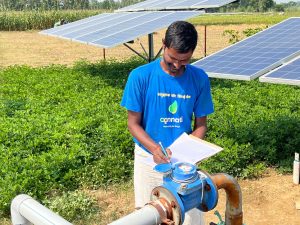 A solar pump operator at a solar irrigation site. Operators are hired locally at the village level and trained to provide Pay-Per-Use services in their communities.
A solar pump operator at a solar irrigation site. Operators are hired locally at the village level and trained to provide Pay-Per-Use services in their communities.
Social Impact
Eighty percent of our users come from historically marginalised communities and 100% are BoP farmers. In addition, Oorja has also created full-time employment for people from last-mile rural communities. It hires operators from the local community to operate and maintain its solar equipment, collect payments and report technical glitches. Oorja adequately trains the operators to perform day-to-day sales and collection activities, clean and maintain the solar PV panels and deal with customer complaints. So far, 36 green jobs have been created in last-mile communities – progressing towards SDG 8 (Decent Work & Economic Growth) and SDG 1 (No Poverty). These outcomes have a considerable impact on the rural ecosystem, more so at a time when rural people are experiencing large-scale migration to urban areas for better livelihoods.
Gender Mainstreaming
Oorja integrates women along the entire value chain of its operations as customers, employees, and trains women farmers on sustainable agricultural practices so as to have agency in their community and uplift their economic well-being. Oorja has trained 65+ rural women under its Krishi Sakhi program. They were trained to increase their livelihood opportunities and improve their participation in decision-making. This was an opportunity for women farmers to acquire new skills and knowledge enabling improved quality of life. They received additional capacity building on agri-business management, financial and digital literacy, and new agronomic techniques to help them expand into new growing seasons. They were also provided with technical training so that they can find gainful employment as Operators for our solar assets. In 2022 we implemented our gender mainstreaming plan. Today, 15% of registered customers (direct users) are women farmers, up from 5% in the previous year.
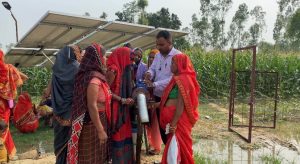 Women farmers undergoing training on the operation of solar pumps.
Women farmers undergoing training on the operation of solar pumps.
PARTNERSHIPS
Oorja collaborates with organisations having similar objectives so as to accelerate its reach and impact. It has established long-term partnerships with large agriculture focused organisations, philanthropic organisations, and well-reputed national and international organisations to deliver farming services to smallholders. Oorja has fostered partnerships with international development organisations including the Deutsche Gesellschaft für Internationale Zusammenarbeit (GIZ), the Aga Khan Foundation and HCL Foundation. These organisations have partnered with them for implementation and co-financing of solar projects. Oorja also partnered with Basel Agency for Sustainable Energy (BASE) to implement the open source data science-based mobile application called ‘Coldtivate’ to digitise the cold storage operations, under the YVCCA project. In 2022, it partnered with South Pole to sell decentralised renewable energy certificates (D-RECs) from its high-impact solar projects that directly displace fossil fuel. Oorja has established academic partnerships with Santa Clara University, University of Southampton, Imperial College London, Amrut Mody School of Management, who have supported it in research and academic case study development on its innovative Pay-Per-Use business model in the agricultural sector. In addition, Oorja is collaborating with Deloitte’s D2i international consultancy team for research, business model refinement and development, and implementation of tools to improve processes and support its scaling objectives.
AWARDS AND RECOGNITION
Oorja has received several awards and accolades for its work on energy access, sustainable agriculture, and climate action. Most recently, Oorja won the 2023 Mercom India Award for the Best Off-grid Project, and the 2023 Startup Transition Award in the Quality Energy Access and SDG-7 category. At present, it has been shortlisted for the Renewable Transition Challenge 2023, the 2023 Ashden Award for Energising Agriculture, and also nominated for the Earthshot Prize 2023. Oorja won the Echoing Green Transformational Funding Award and the National Agri Startup Award from MANAGE-Samunnati – both in 2022. Oorja’s pioneering Pay-Per-Use model was recognised in a 2022 World Bank report as a critical intervention needed for the off-grid energy sector. It has received several other accolades from the likes of Forbes, MIT Technology Review, Keeling Curve Prize among others.
LESSONS LEARNT AND FUTURE PLANS
The servitisation of decentralised solar-powered productive energy has already caught the attention of large agriculture-focused organisations, and esteemed national and international organisations. They have reached out to partner with Oorja to further accelerate our reach. Besides the current B2C model, it is also working on a B2B2C model for delivery of solar irrigation services to agribusinesses, corporates, and SMEs who engage with smallholder farmers. These clients would pay a fixed monthly amount as per contract in exchange for delivery of farming services, and ownership of assets would be transferred to them in 3-5 years. The end-user groups are expected to be the same under both B2C and B2B models. This will enable Oorja to work at scale, enter new geographies, generate new revenue streams through fixed offtake contracts, and accelerate its impact through partnership with large organisations. It will lead, eventually, to transitioning from a commercial pathway to a public-private partnership to scale in order to increase its impact, completely replacing the existing polluting, costly and unreliable diesel-centred forms of irrigation, milling and cooling with our clean, affordable and reliable clean energy-based appliances.
In the next 10 years, Oorja’s scaling plans are to deploy 10,500 new solar projects under this novel Pay-Per-Use model, effectively growing its deployment capacity 100-fold. This would enable Oorja to reach 1.35 million people spread across south and southeast Asia and Africa. Furthermore, this would allow it to prevent at least 600,000 tons of CO2e emissions annually by directly displacing fossil fuel and fossil-derived fertilisers. In the long run, this initiative has the potential to revolutionise the landscape of the water-energy-food nexus and move towards wide-scale decarbonisation of agriculture for small-scale farmers, significantly contributing to SDGs for inclusive, sustainable and resilient climate change policies.
Recommended Reading
Mercom India Award for the Best Off-Grid Project. 2023: https://www.mercomindia.com/mercom-winners-2023-renewable-industry-awards
SET Award for Quality Energy Access & SDG-7: https://www.startup-energy-transition.com/winners-set-award-2023/
Advancing Climate Change Solutions on a Global Stage: https://www.youtube.com/watch?v=K9bvUVQMLOc
REN21, 2021: Oorja’s pay-per-use model mentioned in Renewable Global Status Report
Solarising the Agri-energy sector. https://www.youtube.com/watch?v=fE8kH5stk8I
Showcasing the solar cooling service launched in Bihar, India (in Hindi). https://www.youtube.com/watch?v=2SLO_Zoac94
Academic publication comparing techno-economic viability and carbon mitigation potential of solar, biomass and diesel based energy in rural India. Co-authored by Oorja CTO Clementine Chambon. Published in peer-reviewed journal Renewable Energy (Elsevier). https://www.sciencedirect.com/science/article/abs/pii/S0960148120303165
 Argha Ghose is Communications Associate at Oorja. He is a writer and communicator with four years of experience in the higher education and social impact domains. At Oorja, he manages internal and external communications, handles social media engagements, writes fundraising applications and assists HR in reinforcing organisational values and culture. (Email: argha.ghose@oorjasolutions.org).
Argha Ghose is Communications Associate at Oorja. He is a writer and communicator with four years of experience in the higher education and social impact domains. At Oorja, he manages internal and external communications, handles social media engagements, writes fundraising applications and assists HR in reinforcing organisational values and culture. (Email: argha.ghose@oorjasolutions.org).
 Ankur Singh is Senior Manager at Oorja. He is a management professional who has been working at the intersection of livelihood, gender and poverty alleviation for over six years. Experienced in on-ground implementation and program management of various government and non-government projects, Ankur has also led strategy and business development with his past organisations. (Email: ankur.singh@oorjasolutions.org).
Ankur Singh is Senior Manager at Oorja. He is a management professional who has been working at the intersection of livelihood, gender and poverty alleviation for over six years. Experienced in on-ground implementation and program management of various government and non-government projects, Ankur has also led strategy and business development with his past organisations. (Email: ankur.singh@oorjasolutions.org).

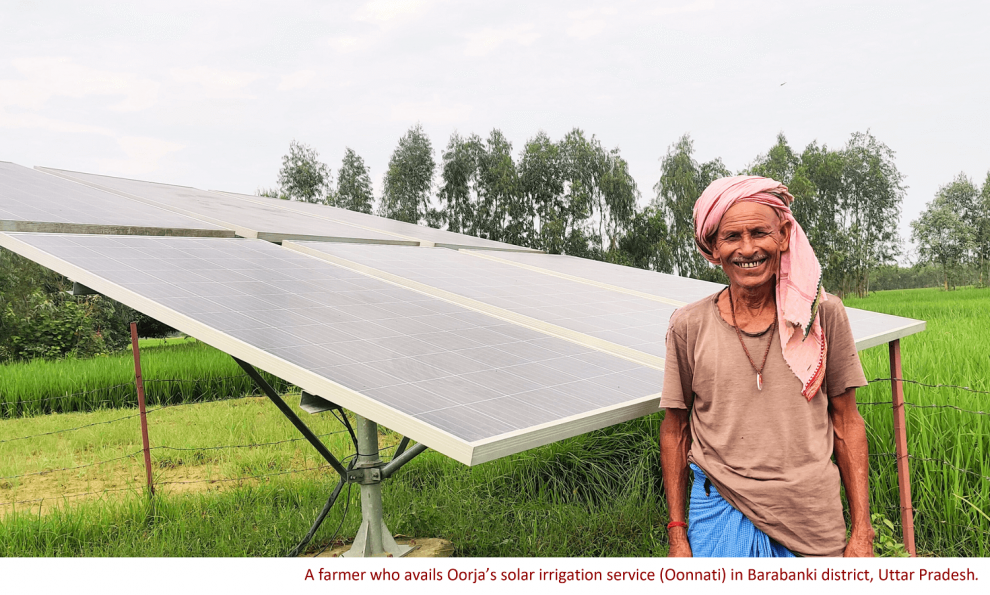
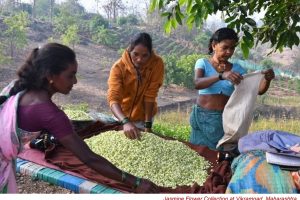
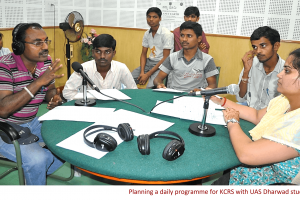
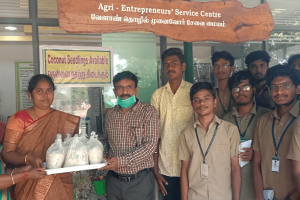
Add Comment